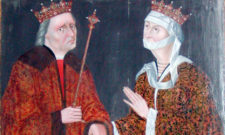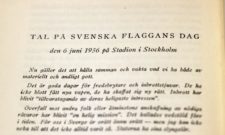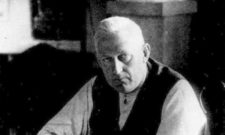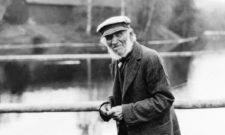Shop our historical maps
History
A writer and his view of history - Vilhelm Moberg and Nils Dacke

Apr
In Vissefjärda and Virserum there are statues commemorating Nils Dacke and the rebellion he led. So Nils Dacke is not forgotten, but what image do we have of him today? And what image do we have of Vilhelm Moberg?
Article first published in Vilhelm Moberg-Sällskapets småskrifter nr 7, New Day with Moberg (2010). Reprinted with permission from Ulf. Thanks!
Nils Dacke actually fought with weapons to preserve self-government, reduce or abolish taxes and against the abuses of the Fogd - the legal rot of the time! Nils Dacke was thus a rebel leader against his rightful sovereign, no wonder Gustav Vasa condemned him and called him: "Thief, traitor, not a Christian man but worse than a heathen... A gross beast and forest traitor, little better than an unseemly animal" Moreover, Dacke led insidious raids. Today he would probably be called a terrorist! But you don't. Today he is associated with bread, rally races, bus companies and schools, honourable perhaps but the risk is that he becomes a harmless monument, like a statue in Virserum!
Vilhelm Moberg is not forgotten either - but how is he remembered? I have been guiding bus tours and giving lectures for 25 years about Moberg and his writing, and I talk a lot about Moberg the emigrant novelist. This image of Moberg has come to dominate completely, an image that risks turning Moberg into a harmless national monument, he who in some parts was a rebel leader, with the typewriter as his weapon!
Moberg's view of history, and thus his social and political outlook, has been debated and analysed several times over the years. Not least, Johan Norberg's book Vilhelm Moberg the Resistance Man at Timbro publishing house is of great importance in trying to make Moberg a bourgeois liberal. Last year (2009) Jens Liljestrand's doctoral thesis was published Mobergland which gives a detailed account of how Moberg was influenced by the Cold War when he wrote The Emigrant Books. The book is very interesting even though I think Liljestrand sometimes tries to squeeze Karl-Oskar, Kristina, Robert and Ulrika into his Cold War template in a strained way. Liljestrand also makes an important argument about Moberg as a national author and the canonization of the emigrant series. The very thing that risks making Moberg a harmless monument!
A short version of Liljestrand's book and other interesting information can be found in the Vilhelm Moberg Society's book Further with Vilhelm Moberg (2009). In addition, two books of letters edited by Liljestrand have been published in recent years: "God willing and health lasting" and "You think I'm dead, don't you?" and a very interesting correspondence between Vilhelm Moberg and Sven Delblanc: Brother Ville, dear sweet Sven as well as the major work Vilhelm Moberg takes a stand, a doctoral thesis by Anna-Karin Carlstoft-Bramell, in which the entire journalistic work of Vilhelm Moberg is presented and examined. The interest in Moberg and his writing is truly alive!
All the books mentioned above have deepened my picture of Vilhelm Moberg and without doubt he is, especially in the 1940s - 50s when he writes The Emigrant Novel, a great friend of the United States and an outspoken anti-communist who is close to Herbert Tingsten on many issues. Liljestrand provides ample evidence of this, including in the letters Moberg writes during his time in the United States. Here are a few examples:
It's a shame I'd be 50 before I got here, you should have lived here for the last 30 years... I have to confess... when I put one thing and another together: the complete freedom out here and all the shit you read about back home... every day I feel less and less like going back home...
My thoughts about Sweden's foreign policy are so low that there is no measure for it... I have written letters of allegiance to all the neutrality idiots in higher positions... as soon as I get a mandate I will sign the Atlantic Pact (NATO) on behalf of Sweden...
There are many other statements and letters in the same vein reproduced in these books.
There is another Moberg!
But it was a different Moberg that I encountered when I immersed myself in the history of the Dackefejdens and thus in Moberg books like Traitorland and My Swedish history - told to the people. This other Moberg can also be represented by novels like Ride tonight!, Soldier with broken rifle and the debate book Otron's articles. This Moberg can also be found in Otto von Friesen's excellent selection of opinion articles in the book In your own case. Uncomfortable contributions to public discourse (1984).
When Moberg brings up Dacke in My Swedish History he points out that "the Dackefejden was a civil war, nobility against commoners, and it was judged on this basis. Only later has it been established that it was a real popular uprising, the largest in Swedish history". Anyone who "is to write about the Dackefejden from a new, radical, holistic perspective is on uncharted territory", Moberg wrote in 1971. This is not entirely true, but Moberg puts a clearer class perspective on the Dackefejden than anyone has done before (possibly with Fabian Månsson the exceptions).
The Dackeu Rebellion 1541-43
Moberg sees the period before Gustav Vasa as the golden age of the peasantry and gives four reasons for the rebellion.
- The most important are the economic ones: new and increased taxes and duties. Professor Lars-Olof Larsson [author of the book Dackeland] indicates that the tax increases could be up to + 300 %!
- Political: safeguarding traditional self-government. Moberg writes about the special position of the Värend "rebellious countryside", e.g. the so-called peasant peace, see below.
- Ecclesiastical: maintain traditional Catholic doctrine and concretely stop the looting of churches: in 1541 alone, 3.7 tons of silver and gold were seized!
- Social: the lack of justice, the abuse of the guardians.
Moberg draws a parallel to a person who was current at the time (1971), Che Guevara. However, he objects to equating the two completely: Che Guevara fights for a new society, Dacke for a return to an old one, Che was a communist and Dacke represents extreme peasant individualism. But, writes Moberg, they are united by their indomitable spirit of freedom and "as a spontaneous liberation movement and struggle for elementary human rights, the Dacke feud is still relevant, a timeless revolution". Moberg also makes another topical analogy when he writes: "Medieval guerrilla fighters lay in the forests and shot bailiffs with arrows from ambush, a ruthless and cruel warfare, though less cruel than the modern war in Vietnam, where pilots from protected positions high above the ground indiscriminately murder a defenceless peasant population."
Moberg also draws attention to Gustav Vasa's demagogic tricks:
The king himself wrote a letter in the name of the Dalamanni, condemning the treacherous commoners in Småland and promising his dearest lord and King Gustav help against the thieving pope. The King's bailiff in Dalarna affixed the county coat of arms to the false letter and it was spread by disguised bailiffs dressed in peasant clothes... The propaganda coup has hardly been surpassed by the Nazis.
Gustav Vasa succeeded with the false letter to lure 500 valley men to fight against Dacke. Of this, Moberg writes: "A tragedy often repeated in the history of peoples took place: people of the same social position and with the same interests in life take part in wars on opposite sides and kill each other". This is a view of history that can be expressed as "workers of all countries - unite" or "the people against the masters"!
Moberg does not make much use of class concepts and perhaps did not himself equate his view of history with that of historical materialism, but I believe that in My Swedish history, as well as in Traitorland, he often argues in just such terms. In addition, Nils Dacke's life path really fascinates Moberg, who writes:
In terms of shifts and changes in a short time, no Swedish human fate can compare with Nils Dacke's: peasant - crown torpedo - guerrilla - rebel leader - chief of Småland - negotiator as equal to the king of Sweden - sought as an ally by the world's most powerful man Emperor Charles V - defeated rebel leader - again guerrilla - refugee.
The Peasants' Liberties
Moberg also discusses the so-called peasant peace (frontier peace) in My Swedish History, and here you will find an interesting quote concerning the power struggles between the Swedish and Danish royal powers, especially when Gustav Vasa challenged the legally appointed Union King, Danish Kristian II. There were times when the Smålanders did not know who would prevail, who they would pay taxes to. Moberg writes:
Before making up their minds, the Smålanders wanted to see who would win - an opportunistic and unheroic attitude, reminiscent of Sweden's policy of neutrality during the Second World War. But the aim and purpose of this - the preservation of peace - was as good and humanly explicable in the 16th century as it was 400 years later.
Compare this attitude with earlier quotes in which Moberg heckles those he calls "neutrality idiots", the so-called third position, in Sweden in the 1950s, when he wants Sweden to join NATO. That's two different Mobergs indeed!
Moberg also writes with fondness about how the memory of the peasant wars lived on in family after family and mentions that the MP Jonas Jonasson from Gullaboås (in Dacke's hometown) was inspired by these peasant wars and was perhaps the first in the world to move a motion for peace and disarmament in the Swedish parliament, in 1869. Jonas Jonasson believed that this idea was becoming more and more popular among the people but the rulers were paying less and less attention to it and he proposed a kind of UN with reference to the peasant peace!
As a young man, Moberg was an anti-militarist, like Valter Sträng, the main character in the autobiographical novel Soldier with broken rifle. Moberg changes his mind in the 1930s in the face of the growing threat from Hitler Germany, described in Give us the earth! (1939), the third part of the Toring triology, in which Lowered banknote rating (1935) and Sleepless (1937) are the other two. Moberg both prepares himself and agitates for strong defence - but at the same time opposes censorship and concessions! A summary of Moberg's views on defence/war power and military force becomes "a necessary evil" and it should be to defend the territory of the country - not to attack other countries!
Traitorland
It is this other Moberg whose voice speaks in his last novel Traitorland (1967). Set in the borderlands between Swedish Småland and Danish Blekinge, down by the Furs bridge over the Lyckebyån, the novel is about two families on either side of what was the border between Sweden and Denmark in the 16th century. Here at the Furs bridge, peasant peace agreements were made on several occasions, at least 9 times:
1361: when Valdemar Atterdag attacked southern Sweden
1434: during the Engelbrekt Rebellion
1505: during the War of the Sturgeons against the Kalmar Union. This peace is the first whose text is known.
1514, 1520, 1611-13, 1642-44, 1657 and last time 1677. These were the traditional leaders of the parish; priests and others who represented the people.
The actual text from 1505 is preserved and speaks clearly even today:
If one of their lords wants to do any cleansing or harm on the other lord's land, and the general public finds out, then they shall stand by each other and no one shall follow his lord beyond the border.
The text from 1657 is also preserved:
Have we concluded peace and neighbourly harmony and given each other mutual assurance that, notwithstanding any discord between both crowns Sweden and Denmark, none of the men of these parishes would fall upon each other and with murder, robbery and fire inflict any harm on each other without keeping fair neighbourly relations among themselves as before.
This is some of the real-life background to the novel Traitorland. When Moberg has the parish priest read out the proposal for a peasant peace/border peace, it is taken almost verbatim from the real text.
Moberg saw these peasant peace treaties as the people's peace against the war of the lords/kingdoms while the king saw it as treason. So Moberg is not a pacifist, there is a justified violence, but he is also no friend of aggressive war, his view is the one expressed in the peasant peace: no one should follow his master further than the borderland.
In his very last book, Otron's articles, Moberg returns to this theme when he discusses Tore Zetterholm's book We meet at Rynge. Moberg writes: "Isn't there something we can call self-defence violence, which oppressed peoples resort to out of sheer self-preservation?"
Vilhelm Moberg's view of the United States underwent a major reversal in the 1960s, as can be seen in the afterword "20 years later" in the partially revised edition of The unknown family (1968). In it, Moberg writes that "the United States is no longer the country to which rebels and insurgents flee" and that the main reason for this is the Vietnam War.
Soldier with broken rifle
For me Soldier with broken rifle (1944) is a key novel in the question of assessing Vilhelm Moberg. In a letter to Sven Delblanc, Moberg comments on the criticism from the (S) side of his description in the novel that social democracy had abandoned its original socialist ideals:
"But today it is impossible to imagine a Social Democratic journalist who is so naive... or even stupid that he goes out during an election campaign and gives the lecture that Valter Sträng gave in 1921... he gave the whole programme... the party's only truly socialist, not to say Marxist, programme...
Olof Palme is for me editor Fläderbaum in a new edition..." (Moberg - Delblanc, p. 59)
How much of Vilhelm Moberg is Valter Sträng? In a radio interview on 26/8 1969, almost exactly 4 years before Moberg chose to pass away, Ulf Örnkloo asks the question and gets the answer: "It is my most autobiographical novel character without being a self-portrait. I wanted to draw the picture of an idealist from the breakthrough years of the labour movement, an anti-militarist," says Moberg. "But," Moberg continues, "I myself renounced pacifism when Hitler and Mussolini appeared on the scene, I realised that there must be a need for self-defence."
When asked if Valter Sträng is not something of a favourite child, Moberg replies:
Yes, none of my characters have experienced so much of what I have experienced. Valter Sträng was much more politically active than I was. Valter wanted to become a class warrior. Perhaps I had that ambition as a young man but realised as I got older that I wasn't cut out to be a politician. I believe that a writer should not, in principle, belong to a party, then you have to take irrelevant considerations into account.
Moberg also notes that it is "obvious that I am quite far to the left on most issues, just like Valter Sträng, on all the issues on which he took a stand: the throne, the sword, the altar and the money bag."
Moberg's view of society
In his book Mobergland, Liljestrand discusses whether Moberg's view of society can be defined as bourgeois liberal or as the anarchist-syndicalist side of the labour movement. You can stick different labels on Vilhelm Moberg but let me make some comparisons:
- Between the Moberg who in the introduction to My Swedish History writes that "if I had been born in a different class of people, I would have written a different story" and today's academic and intellectual elite, where "people" is almost an ugly word or something embarrassing from earlier radical times, are now moaning about!
- Between the Moberg who writes because he has to and the ideal of relaxation and entertainment that television serves us today!
- Between the Moberg who let Knut Toring agonize over and finally leave his humiliating work in the service of stupidity and today's detective hysteria!
- Between the Moberg who was one of our most investigative journalists and the state that put the IB informers in jail!
- Between the Moberg who in the introduction to My Swedish history writes about the distorted view of history that textbooks gave, by omitting facts and today's state-controlled historiography in the form of the "Forum for Living History"!
- Between the Moberg who wrote pamphlets for the people's defence during World War II and today's paid Swedish professional soldiers who are promised in writing that they will be able to fight all over the world, for example in Afghanistan. Compulsory military service is part of democracy; it is not only an obligation but also a right to defend the country.
When I make these comparisons, it is not to put a partisan label on Vilhelm Moberg, but it is about the people in history versus the authorities, an issue that spans party and bloc boundaries.
Or as Valter Sträng puts it when he explains for whom he is writing:
And so I write about this hillside, about other hillside huts around, I tell about the people of these huts, about the toil and hardship, poverty and pride, humiliation and grandeur of the swamp people. Describing the people just because they are people.
And my ancestors rise from nameless, forgotten graves, father and grandfather and great-grandfather rise again from the dust, and I tell them what I know to be true and true about them and what I know to be true.
And about the women of the cottages, about mother and grandmother and great-grandmother, the strong, silent women who bear the many children and carry the heavy burdens.
This people has lain in slumber, submissive, resilient, forgotten, mute, unaware of its power and possibilities. I would now like to give a picture of the illiterate race, which I have not yet been able to recognise in any printed book, for I am so close to it myself that I have the illiterate in the immediate family.
I want to describe its work, explain its obscurity, give it a voice and join in its quest to discover itself.
So it occurs to me that this could be my true vocation - that this could henceforth be my class struggle.
You can read Moberg in different ways, you can put different labels on him, you can try to squeeze him into any number of Cold War templates, but I can't possibly make him fit the current social system. The supervision contradictory image of Vilhelm Moberg becomes understandable if one sees Moberg's writing as part of the popular leftist tradition that has existed since the French Revolution. It includes not only the working class in the narrow sense, but the working people. In Moberg's time it was the commoners, i.e. the peasants, the small farmers, and today the workers, the civil servants, the health workers, the business people, i.e. the vast majority of the population.
This popular left is not limited to parties and people who call themselves socialist, left-wing or whatever, but is much broader. It is the left that wants to reclaim the deliberately omitted history, or as Valter Sträng says: "I want to resurrect the dead" and by that he means the swamp people and their history.
It is the struggle against the corrupt authorities, which Moberg began already in Cash short, continued with in A P Rosell Bank Director and culminating in the court case. My Vilhelm Moberg belongs to that tradition, and he is a prominent figure in it!
Author's comments on republication
Titles free-drilling bonde fits with the page Allmogens highlights of Moberg and there probably Johan Norberg only partly fits in [in reference to Norberg's book Vilhelm Moberg the Resistance Man and his article on Vilhelm Moberg's struggle against authority]. But there are other sides too, sides that I want to emphasize! Therefore I would like to include the following comments. The first is a quote from Soldier with broken rifle where Moberg has Valter Sträng say the following about his childhood:
"Here I had my childhood, poor and meagre...The foster country gave me no opportunities, but did not prevent me from conquering them myself...In a country without this human freedom my growth might have been stunted. From the country...in which one is born, one has the right to demand this: opportunities - and equal opportunities! A levelling out of this difference in lot is a demand that my sense of justice has raised over the years...The lot of poverty no one shall try to make beautiful in my eyes. Poverty is only ugly and degrading and embittering... and is an accident, but not a necessary accident, imposed by fate... But it may, in some cases, create its counterbalance... in the determination to overcome its degradation. This may have been the case with me."
Moberg thus sees class differences/inequality not as imposed by fate but as the result of class society.
Some, such as Johan Norberg, seek to make Moberg a liberal, and certainly that side exists too. But one then forgets what Moberg wrote in the Last Letter to Sweden:
When Karl-Oskar accuses the hunter Nöjd of having his dogs kill sheep on his land, Nöjd replies, "Your land, Nelson... it's no more yours than mine! ...All the land here is stolen from the Indians!" When Karl-Oskar replies that he didn't steal, but bought, Nöjd replies, "But you bought bull goods! You've got all the damn cheap stuff... You keep your mouth shut about your lands, Nelson." Karl-Oskar threatens to attack Nöjd, who then says: "Your trade is honest, allright. It's made according to the law. The law that the whites made afterwards - after the theft. But you can't buy a mantle of land in America that isn't taken or cheated from the Indians! What would the government have paid them for the whole Mississippi Valley? ... A 200th of a cent for an acre... For the most fertile land in the world. That was the thieves' price ... and not even this pittance could the Indians get out! There was only starvation left for them! Keep your sheepskin, Nelson. Then kiss my asshole!"
Or in Man's woman:
When Hakan can't pay his debts and suggests stealing it, Märit is horrified and says that the debt must be paid by all honest people, Hakan replies: - "Honest? Who is honest, do you know anyone... Or could she tell who sold land to the first farmer? No... because the first farmer stole the land... Märit means that the one who has cultivated the land has honestly paid with his effort" and Håkan replies: - I have toiled seven years on my fields, but they are not mine yet. They will never be mine!... Now seven years of his life had been spent so that the merchant Schörling would receive his annual interest... now it could be enough. It was thought, of course, that he would let it go on like that ... until he was carried to his grave. Then a priest could stand up at his mole and say: "Here in the coffin lies Hakan of the family of the sons of Ingel. He came from the earth, his life was spent in the payment of rents and taxes for the earth, to earth he shall return!"
Moberg thus sees that private property is not something natural or eternal. Allmogens rightly quotes much of Moberg on war and peace, on the defence of the country (which I touch on in the text on Moberg and Dacke). There are also quotes here that show Moberg's insight into class society.
Moberg points out that "all wars arise out of social problems" (writing Northern Europe 1938) and "It is ultimately over the earth's natural resources that men are fighting today..." (from Oxford and Us, In your own cause p 17), thus rejecting the idealistic view put forward by the so-called Oxford Movement in the 1930s. Moberg writes ironically about the trusteeship idea advocated by Oxford and notes that then the landowner can continue to "manage" his property because he is not required to account for it in this world! But his steward is and remains a steward, it is now so ordained by God's decree! Moberg notes that the Oxford Movement does not want to change the distribution of the earth's spoils - the existing should be left alone!
Moberg makes here an almost historical-materialist analysis of the Oxford Movement, he sees its class character.
From an almost uncritical admirer of the United States, Moberg became increasingly critical during the 1960s, not least of the then ongoing war in Vietnam. In an afterword to the book The unknown family (1968) he writes:
"I don't think America has any acceptable reasons for waging war in Asia... I can't in any way see it as America's defensive war. After all, the vast American continent is in no way threatened by the people of North Vietnam, even if its regime is communist...
The strongest military power in the world... is constantly dropping bombs on the poor peasants of North Vietnam... and the victim of the US bombings is a primitive peasant country which cannot reach the aggressor with corresponding weapons of terror in his own country... We should by now have seen through one of the greatest and most fatal lies in world history: that a people can defend its homeland by attacking other peoples, that the homeland can be defended in other countries as well."
Subscribe to YouTube:
If you appreciate Allmogens independent work to portray our fine Swedish history and Nordic culture, you are welcome to buy something nice in the shop or support us with a voluntary donation. Thank you in advance!
Support Allmogens via Swish: 123 258 97 29
Support Allmogens by becoming a member
Support Allmogens in your will








